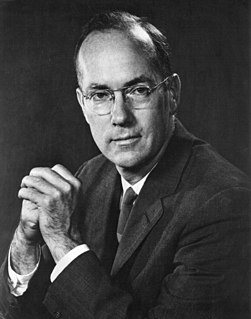A Quote by Charles Hard Townes
Science, with its experiments and logic, tries to understand the order or structure of the universe. Religion, with its theological inspiration and reflection, tries to understand the purpose or meaning of the universe. These two are cross-related. Purpose implies structure, and structure ought somehow to be interpretable in terms of purpose.
Related Quotes
One of my optimistic prophecies is based on the assumption that machines could have the best algorithms in the universe, but it will never have purpose. And the problem for us to explain purpose to a machine is because we don't know what our purpose is. We have the purpose, but we still ... When we look at this global picture, a universal picture, to understand what is our purpose being here on this planet? We don't know.
There have been prophets and students who handle the Bible like a child's box of bricks; they explain to us the design and structure and purpose; but as time goes on things do not work out in their way at all. They have mistaken the scaffolding for the structure, while all the time God is working out His purpose with a great and undeterred patience.
Science and religion are not antagonists. On the contrary, they are sisters. While science tries to learn more about the creation, religion tries to better understand the Creator. While through science man tries to harness the forces of nature around him, through religion he tries to harness the force of nature within him.
To speak of certain government and establishment institutions as 'the system' is to speak correctly . . . They are sustained by structural relationships even when they have lost all other meaning and purpose. People arrive at a factory and perform a totally meaningless task from eight to five without question because the structure demands it be that way. There's no villian, no 'mean guy' who wants them to live meaningless lives, it's just that the structure, the system demands it and no one is willing to take on the formidable task of changing the structure just because it is meaningless.
To assert that the universe has a purpose implies the universe has intent. And intent implies a desired outcome. But who would do the desiring? And what would a desired outcome be? That carbon-based life is inevitable? Or that sentient primates are life's neurological pinnacle? Are answers to these questions even possible without expressing a profound bias of human sentiment? Of course humans were not around to ask these questions for 99.9999% of cosmic history. So if the purpose of the universe was to create humans then the cosmos was embarrassingly inefficient about it.
Science may explain the world, but we still have to explain science. The laws which enable the universe to come into being spontaneously seem themselves to be the product of exceedingly ingenious design. If physics is the product of design, the universe must have a purpose, and the evidence of modern physics suggests strongly to me that the purpose includes us
Your inner purpose is an essential part of the purpose of the whole, the universe and its emerging intelligence. Your outer purpose can change over time. It varies greatly from person to person. Finding and living in alignment with the inner purpose is the foundation for fulfilling your outer purpose. It is the basis for true success.
I think religion and science operate in different regimes. Religion is a belief system that tries to give meaning and comprehension to peoples' lives. Science is more about the mechanics of the universe around us and the way in which it works. And I don't think those things have to be mutually exclusive.
Siphonophores do not convey the message a favorite theme of unthinking romanticism that nature is but one gigantic whole, all its parts intimately connected and interacting in some higher, ineffable harmony. Nature revels in boundaries and distinctions; we inhabit a universe of structure. But since our universe of structure has evolved historically, it must present us with fuzzy boundaries, where one kind of thing grades into another.
If our local, observable universe is embedded in a larger structure, a multiverse, then there's other places in this larger structure that have denizens in them that call their local environs the universe. And conditions in those other places could be very different. Or they could be pretty similar to what we have here.
The purpose of formulating [a] conflict as a game is not that of resolving the conflict by 'solving the game.' It is that of displaying the structure of the conflict and thereby exposing features of it that may be concealed by rhetoric. In particular, appreciation of the peculiar structure of some of the so-called mixed - motive conflicts represented nonzero-sum games may change the conflicting parties' perception of their situation.



































